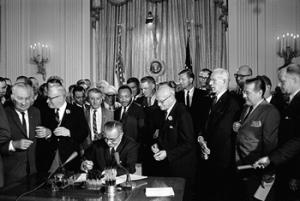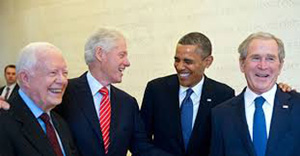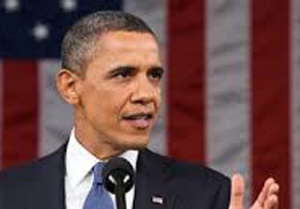
The LBJ Presidential Library at the University of Texas is hosting a three-day Civil Rights Summit, beginning Tuesday of this week, to mark the 50th anniversary of the passage of the Civil Rights Act, which banned widespread discrimination against racial and ethnic minorities and against women. At the time, laws discriminating against African-Americans were still common throughout the South.
President Barack Obama, the first black U.S. president, is scheduled to give the keynote address on Thursday, and former presidents Jimmy Carter, Bill Clinton and George W. Bush also will speak during the week.
Lyndon Johnson's presidency has long been viewed in the shadow of the Vietnam War, a conflict that saw American soldiers die in jungles half a world away while anti-war demonstrators chanted in the streets back home.
Johnson's library is trying to change the focus of future conversations and scholarly work surrounding his time in office by shifting toward the landmark civil rights legislation Johnson signed into law.
"I'm hopeful Lyndon Johnson gets recognition for the remarkable legislation he ushered in," library director Mark Updegrove said. "In 100 years, we will be studying the civil rights movement of the 1960s. That will be of far greater historical consequence than the war in Vietnam."

Lyndon Nugent, Johnson's only grandson, said that while Johnson took responsibility for the Vietnam War and the nation should learn from the experience, it'll become less relevant to Americans as time passes. But the civil rights legislation, he said, will continue to guarantee equality and be Johnson's lasting contribution.
"Civil rights was the reason that LBJ got into politics to begin with, to help people," Nugent said. "What he was focused on, and what he always wanted his presidency to be about, was trying to make America a better place for everybody."
The summit will both look back at the civil rights movement and address issues still lingering in the U.S. and globally. Panel discussions will feature political and civil rights leaders and academics discussing topics from immigration and gay marriage to the role of sports in the civil rights movement.
Among those scheduled to participate are San Antonio Mayor Julian Castro, former congressman and United Nations ambassador Andrew Young and Bernice A. King, the youngest daughter of civil rights leader Martin Luther King Jr., and chief executive of The King Center in Atlanta.

The library also has a "Cornerstones of Civil Rights" exhibit that features the original Civil Rights Act of 1964 and Voting Rights Act of 1965, both signed by Johnson, and a copy of the 1863 Emancipation Proclamation signed by President Abraham Lincoln that declared all slaves free in rebel states not controlled by the union.
Updegrove said having Obama, visit the civil rights summit speaks to the success of Johnson's initiatives, particularly the Voting Rights Act, which protected the voting rights of millions of minorities across the U.S.
"You have in (Obama) one who likely would not have ascended to the nation's highest office if not for the civil rights legislation Lyndon Johnson put forth," Updegrove said.
Subsequent events in coming years will mark the 50th anniversaries of other Johnson initiatives, including Medicare, the Clean Air Act, seatbelt requirements and health warnings on cigarettes.
Vietnam was a "dark shadow that hung over the country and the Johnson legacy," Updegrove said. "We can quickly forget the successes of that era."
Associated Press correspondent Chris Tomlinson contributed to this report.
Copyright 2014 The Associated Press.
